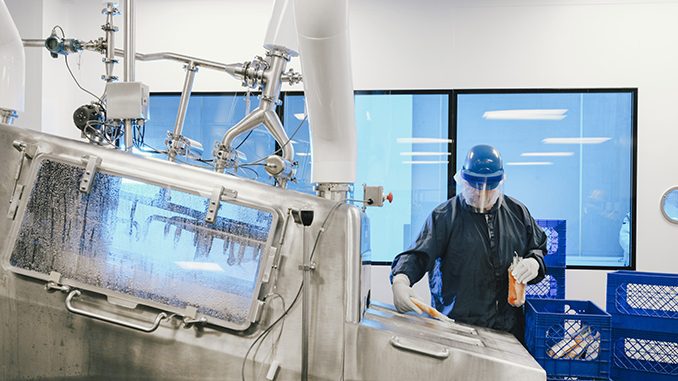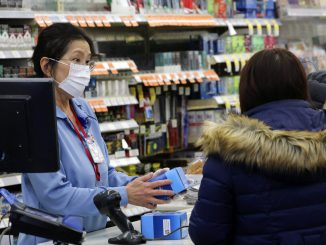
The U.S. death toll from the coronavirus outbreak reached a grim milestone last week topping more than 100,000 victims. Despite this tragic development, dedicated medical professionals and scientists both here and abroad have made enormous progress when it comes to developing COVID-19 tests with an eventual eye towards securing a vaccine in order to minimize the risk of a second outbreak later this fall.
Up until very recently, healthcare professionals and trained first responders have been in charge of administering the majority of coronavirus tests. While a recent poll shows half of Americans are unsure if they would get vaccinated if given the chance, a far greater number say they would undoubtedly get tested for COVID-19 if they had the option. Now thanks to a handful of lab companies with strong ties to North Carolina, these easy, at-home self-collection kits could soon be available to everyone.
Late last week Quest Diagnostics, which has 20 locations across the state including in various urgent care facilities, medical labs and even a Raleigh Walmart store said it was granted FDA Emergency Use Authorization (EUA) for its Self-Collection Test Kits. The kit allows individuals to self-collect samples by swabbing the front part of their nostrils and then ship the samples overnight to Quest where the lab can analyze the results using its SARS-CoV-2 RT-PCR test that received EUA back in March.
Quest President and CEO Steve Rusckowski said that until now testing had been constrained by a shortage of trained healthcare professionals to administer them correctly. These self-collection kits could fix these limitations as they offer ease of access and are consumer friendly. “COVID-19 molecular diagnostic testing has been constrained partly by finite supplies of swabs and trained healthcare professionals to do the specimen collection,” Rusckowski said. “The self-collection kit enables an individual to self-collect at home, and the process is far less invasive and uncomfortable than many traditional methods.”
The company said it plans to have over half a million kits available by the end of June and will make them available through healthcare providers for their patients with priority given to healthcare workers, first responders, law enforcement, and others playing a pivotal role in the fight against COVID. “We plan to utilize this device with a range of populations, from state-run programs and employers to healthcare providers and individuals,” said Jay G. Wohlgemuth, M.D., Quest’s Senior Vice President and Chief Medical Officer.
Another lab with N.C. ties made headlines back in early March, when Burlington-based drug company LabCorp was among the first life sciences companies in the country to wade into the fight against the virus. Since then the company has increasingly advanced its testing capabilities, first making its IgG antibodies test available to physicians and other U.S. healthcare providers and now offering it to the public through its website. The antibody test is free through a physician, and there is a non-reimbursable fee of $10 if obtained through the website. Initially back in April, the at-home collection kits were made available only to frontline medical workers and first responders through its ‘Pixel’ online platform. This latest move is in line with CDC guidelines.
In addition to developing consumer friendly testing, some of the state’s top medical research labs are working towards developing actual treatment options. Grifols, the global biotherapeutics company with major operations in North Carolina, announced in early May that it had begun identifying, screening and selecting volunteers who had recovered from COVID-19 to donate their plasma in more than 100 cities nationwide, including Raleigh and the surrounding area.
Grifols transforms plasma into essential medicines to treat chronic, rare, and life-threatening conditions. In the case of the coronavirus, plasma from recovering patients will be used to produce a hyperimmune globulin that, if proven effective, could potentially treat the disease in others. Medical experts see tremendous promise in such treatment options, assuming enough donors step up to the plate.
Grifols, which oversees a network of over 250 FDA-approved centers dedicated to collecting plasma, became well-known by many across the state back in December 2018 when it announced production of a plasma-derived treatment to battle the Ebola virus for Liberia from its flagship Clayton, N.C. manufacturing site.
Emphasizing the potential for this latest coronavirus treatment, Grifols’ Chief Medical Officer and Vice President of Quality, Regulatory Compliance & Laboratories Dr. Marilyn Rosa-Bray said the hyperimmune globulin would offer doctors a predictable and consistent dosing of the antibody against the virus that causes COVID-19. “For individuals who have recovered from COVID-19, donating plasma at one of Grifols’ donor centers to produce a potential treatment for the disease is a way they can help make a difference during this exceptional time.”
Quest also announced last week that had launched a new suite of ‘Return to Work’ services in an effort to help Americans swiftly return to work and jump start the economy. Their model is built around large-scale workforce coronavirus testing. The services are tailored to customers’ unique workplace parameters and are designed to help businesses access and act on lab results in order to adopt safer surroundings.
“Every workforce has different testing needs depending on the local environment, the type of work, the work environment and interactions with customers for the job category,” Dr. Wohlgemuth said. “Our Return to Work solution can be tailored to each organization’s unique requirements.
Return to Work includes:
- On-site temperature checks and respiratory and blood specimen collection by trained Quest staff. (Diagnostic testing is performed on respiratory specimens and antibody testing is performed on blood specimens.)
- Access to a variety of specimen collection options, ranging from respiratory specimen collection for diagnostic testing to use of the company’s 2,200 Patient Service Centers for blood draws for COVID-19 antibody testing.
- IT solutions that include online questionnaires to help direct participants to the appropriate testing method based on factors such as symptoms and exposure to other sick people.
- Access to telemedicine services.
Quest will prioritize the service for employers with workers that are critical to the pandemic response. “Some jobs are higher risk than others, and we plan to prioritize testing access for organizations that employ healthcare workers, first responders and others whose health and safety are critical to our nation’s response to COVID-19,” said Dr. Wohlgemuth.
“All of us are eager to get back to work as safely as possible and testing is essential to making this happen,” said Rusckowski. He said that through their Return to Work services Quest will empower organizations of all sizes to use concrete lab results to help them foster safer and healthier work environments as the country shifts towards reopening.



